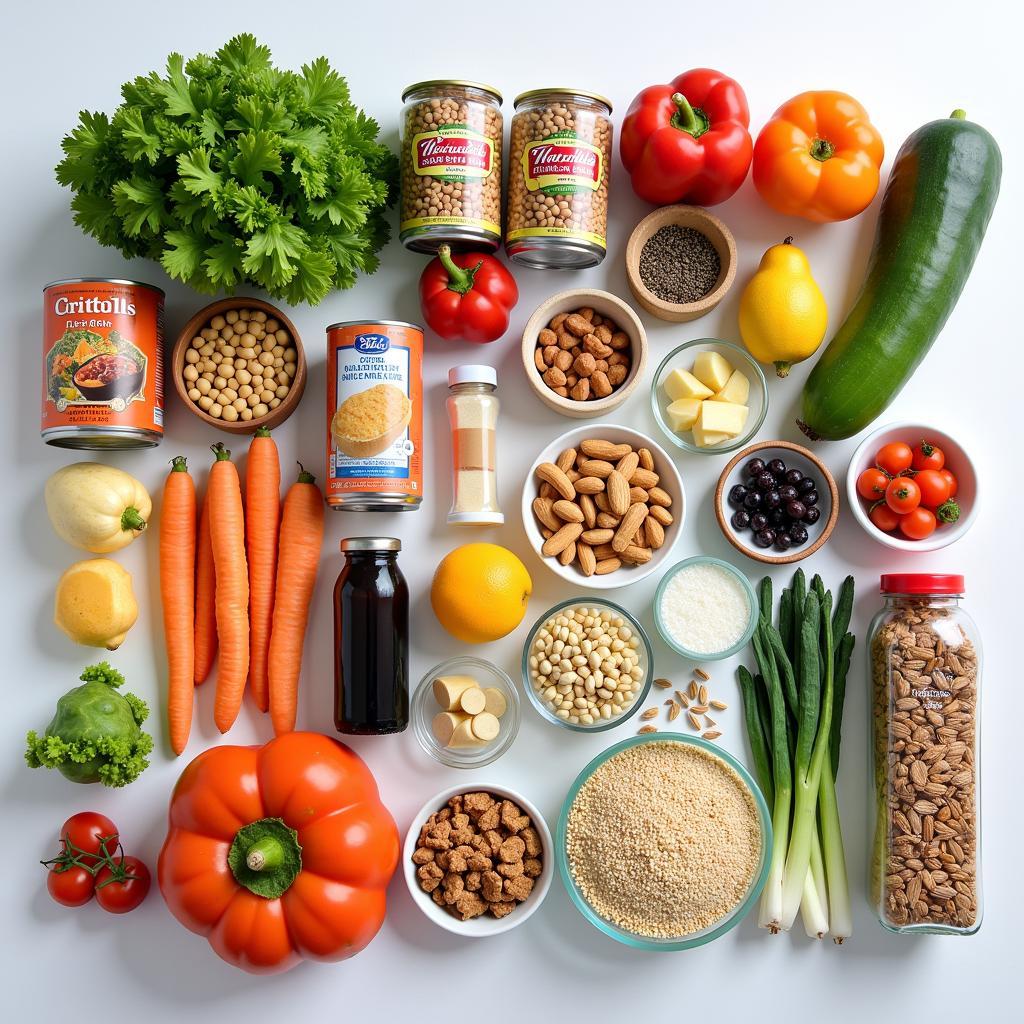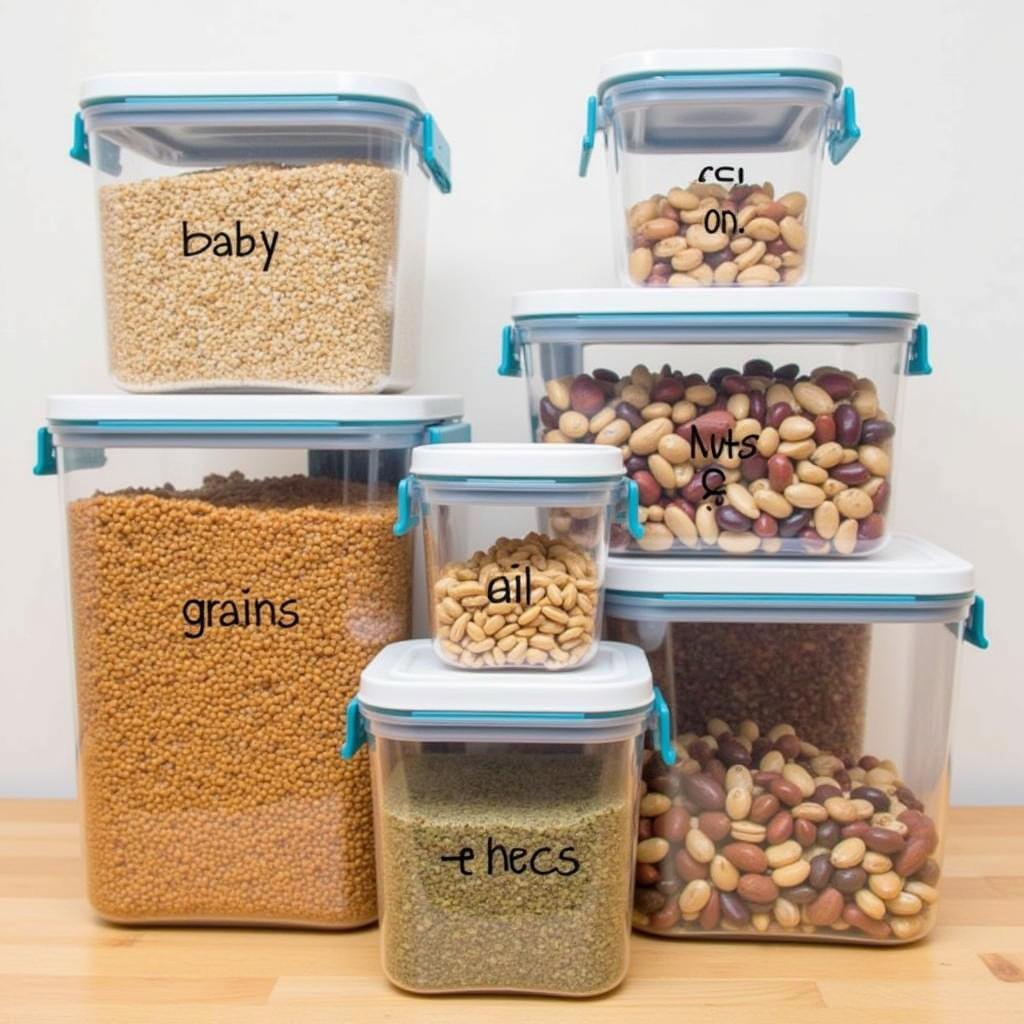Building a survival food kit is essential for everyone, but it can feel a little more challenging for vegans. After all, stocking up on canned tuna and beef jerky just isn’t an option! But don’t worry, creating a Vegan Survival Food Kit that’s both nutritious and delicious is easier than you think. This guide is here to show you how to pack a powerful punch of plant-based goodness that will keep you fueled and satisfied, no matter what comes your way.
 A well-stocked vegan survival food kit with canned goods, grains, and water.
A well-stocked vegan survival food kit with canned goods, grains, and water.
Why Choose a Vegan Survival Food Kit?
Vegan survival food kits are not only about ethical choices but also offer unique advantages:
- Longer Shelf Life: Many plant-based foods, like dried beans, rice, and oats, have naturally longer shelf lives compared to perishable animal products.
- Reduced Spoilage Risk: With proper storage, your vegan supplies are less likely to spoil quickly, giving you peace of mind.
- Nutrient-Dense Options: Vegan kits can be packed with vitamins, minerals, and fiber, crucial for maintaining health during emergencies.
Building Your Plant-Powered Pantry: Essential Components
Ready to create your own vegan survival kit? Let’s break it down step-by-step:
1. Water is Life:
Always prioritize water. Aim for one gallon per person per day for drinking and sanitation. Consider a water filter for purifying additional sources.
2. The Power of Plants:
- Canned Goods: Stock up on beans (kidney, black, chickpeas), lentils, vegetables (corn, tomatoes, peas), and fruits (peaches, pears, pineapple).
- Grains: Opt for long-lasting options like rice (brown or white), quinoa, oats, and pasta.
- Nuts & Seeds: Choose high-calorie options like almonds, walnuts, sunflower seeds, and chia seeds for healthy fats and energy.
- Dried Fruits: Raisins, cranberries, apricots, and mangoes are delicious and provide quick energy boosts.
- Protein Powerhouses: Don’t forget protein sources like peanut butter, protein bars, and textured vegetable protein (TVP).
 Organizing food supplies in airtight containers for a vegan survival kit.
Organizing food supplies in airtight containers for a vegan survival kit.
3. Essential Extras:
- Spices & Flavorings: Salt, pepper, garlic powder, onion powder, and your favorite herbs can make a world of difference in taste.
- Cooking Oil: A small bottle of olive oil or coconut oil is vital for preparing meals.
- Multivitamins: Consider adding a daily multivitamin to ensure you’re meeting your nutritional needs.
- First Aid Kit: A well-stocked first aid kit is crucial for any emergency situation.
Tips for Success:
- Rotate Your Supplies: Regularly check expiration dates and use older items before they expire.
- Store Properly: Keep your kit in a cool, dry, and dark place to maintain freshness.
- Practice Cooking: Familiarize yourself with simple recipes using your survival food items.
FAQs About Vegan Survival Food Kits:
1. What about protein?
Plant-based protein sources are abundant! Include beans, lentils, nuts, seeds, and protein-rich grains like quinoa.
2. How long will my kit last?
Aim for at least a 72-hour supply, but consider extending it to two weeks or more for longer-term preparedness.
3. Can I customize my kit?
Absolutely! Tailor it to your dietary needs and preferences.
4. Where should I store my kit?
Choose a cool, dry place like a pantry, basement, or under-bed storage.
5. What if I have food allergies?
Carefully read labels and avoid common allergens like soy, gluten, or nuts if necessary.
Don’t Wait for an Emergency, Be Prepared!
Building a vegan survival food kit is an act of self-reliance and compassion. By choosing plant-based options, you prioritize both your health and the planet’s well-being. Remember, preparedness brings peace of mind. So, start building your kit today and face any challenge with confidence.
Need help creating the perfect vegan survival food kit? Contact us! Our team of experts at Mina Cones Food is here to assist you. Call us at 02437655121, email us at minacones@gmail.com, or visit our store located at 3PGH+8R9, ĐT70A, thôn Trung, Bắc Từ Liêm, Hà Nội, Việt Nam. We are available 24/7 for all your inquiries.